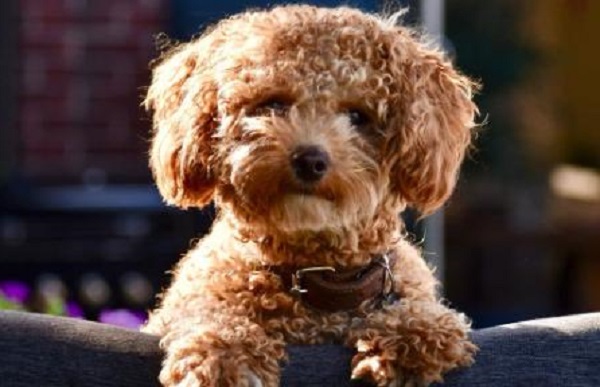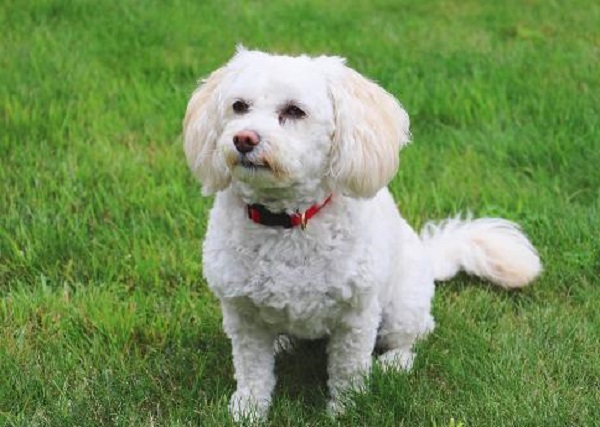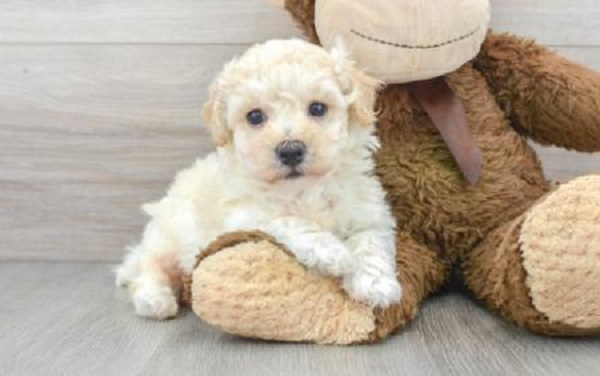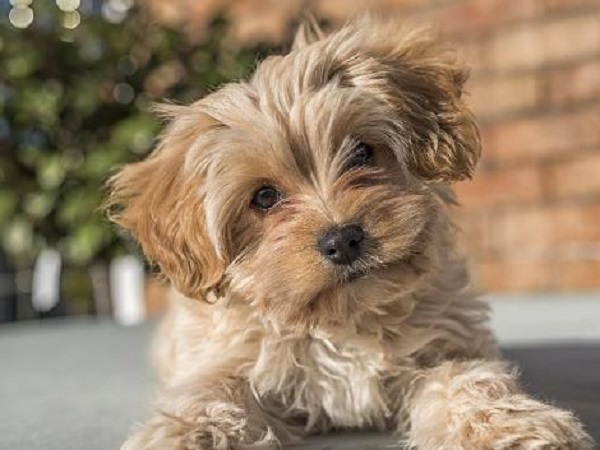Embark on a journey to explore the fascinating world of Poochon in our comprehensive guide. Discover the unique characteristics, diverse colors, and variable temperaments of these small, non-shedding dogs that result from the crossbreeding of Bichon Frise and Poodles. Often referred to as Bichpoos, these hybrids exhibit traits inherited from their intelligent and friendly parent breeds. Join us as we delve into the essentials of Poochon care, including nutrition tips and practical advice to ensure a happy and healthy life for these charming canine companions.

Dog breed history of the Poochon
The historical roots of the Poochon, a charming hybrid dog, are not extensively documented. The breed is believed to have originated in the 1990s in Australia, marking the onset of a trend in “doodle” breeding. This period witnessed a surge in interest after the successful creation of the Labradoodle.
Unlike purebred dogs, which adhere to a precise breed standard outlining specific physical and temperamental traits, the Poochon lacks such standardization. The breed’s hybrid nature results in a wide range of variations in both appearance and behavior. When a Poochon is born from a 50-50 cross between a purebred Bichon Frise and a purebred Poodle, it may exhibit characteristics reminiscent of one parent breed or display a distinctive appearance.
While the decision to crossbreed similar breeds may raise questions, Poochons tend to share similarities with their parent breeds in terms of both looks and temperament. Despite the notion of “hybrid vigor” often being associated with better health, it’s important to note that this concept is more applicable to dogs with diverse genetic backgrounds rather than those resulting from the crossbreeding of two purebred dogs. Poochon puppies, being crossbred, may inherit congenital diseases present in both parent breeds.
It is noteworthy that the Poochon is not officially recognized by major purebred dog registries, such as the American Kennel Club or United Kennel Club, adding to the unique and unstandardized nature of this delightful canine hybrid.
Characteristics of Poochon dogs

Regarding appearance
Poochons are delightful mixed-breed dogs, inheriting a variety of colors such as cream, tan, apricot, black, or grey. Their medium-length, hypoallergenic coat is typically solid, with occasional blends of colors, requiring regular brushing and maintenance. These sociable and adorable companions are known to turn heads wherever they go, with a versatile adaptability to different living spaces, making them an appealing choice for both apartments and larger homes.
Poochon dogs’ personalities
Poochon dogs exhibit a charming blend of cuddliness and playfulness, making them delightful companions. Intelligent and affectionate, they enjoy both relaxation and daily walks, thriving in interactive play sessions and games. Known for their sociable nature, Poochons attract attention during outings, welcoming interactions with both children and adults.
While they can be vocal when under-stimulated, this trait is manageable through indoor play, games, and outdoor walks, with early training playing a key role. Poochons excel in multi-pet households, showcasing their strong social nature and adaptability. Whether in a lively setting or a quieter home, these versatile dogs thrive with attention and love from their devoted owners.
Poochon Size
Given that the Poochon is a recently developed breed, size standards are not firmly established. However, being a cross between Toy Poodle and Bichon Frise parents, Poochons generally tend to be on the smaller side.
Typically, their weight falls between six to 17 pounds, and they stand at a height ranging from nine to 15 inches at the shoulder. As with most mixed breeds, individual Poochons may vary in size, potentially being smaller or larger than the average range mentioned.
Taking Care of Poochon

Taking important steps to maintain your Poochon’s health and wellbeing is part of caring for them. Frequent veterinary examinations are necessary for the early identification of any health problems, enabling a customized treatment plan. Give them regular walks and playtime to avoid weight gain because of their high energy levels. Because Poochons seldom wipe their own eyes, you should give them a handkerchief to help reduce the amount of tears in their eyes. Their general cleanliness is enhanced by monthly nail cutting and regular ear examinations and cleanings. For the best dental health, clean their teeth once a day, following your veterinarian’s advice on the right brushing methods. You can keep your Poochon happy and healthy by following these easy steps.
Dog Fooding
Your Poochon, a petite breed with moderate to high energy, needs a well-balanced food. Keep a regular feeding schedule and refrain from putting food available throughout the day to minimize weight gain.
Your Poochon’s nutritional requirements change as they grow from puppies to adults and finally into old age. Because every dog is different when it comes to weight, energy level, and general health, it is best to see your veterinarian for specific guidance. They may provide specialized advice on the best dog food, making sure your Poochon gets the nutrients they need at every stage of development. A veterinarian consultation guarantees that the food of your Poochon is tailored to meet their individual needs.
Grooming
When brushing, Poochons with undercoats may need to brush more often than dogs with single coats. Poochons benefit from expert grooming every four to eight weeks, just as their parent breeds do. In addition to brushing, you should also clip your Poochon’s nails every other week and check their ears every week to make sure they’re healthy. Use an ear cleaner suitable for pets to clean the ears if they seem filthy. Any indications of excessive dirt, redness, head shaking, or scratching at the ears should be sent to the vet for further evaluation. The general health and well-groomed look of your Poochon are enhanced by regular grooming and careful attention.
Exercise
Despite the lively and energetic nature of both parent breeds, the Poochon’s tiny stature makes these traits easily controlled. For the most part, Poochons get enough exercise from their owner’s indoor or outdoor fun as well as one or two daily walks. Participating in canine sports like agility and flyball may provide happiness and contentment to some athletic Poochons. This flexible workout program makes sure Poochons stay healthy and active within a reasonable range that fits their stature.
Training
Like their parent breeds, the Poodle and Bichon, Poochons are very intelligent and easily trained. The Poochon’s cognitive brilliance is a result of the combination of two breeds: Poodles, which are regarded as among the brightest, and Bichons, who are famed for their past as charming tricksters in the circus. A variety of tempting treats and food prizes, along with clicker training, are examples of positive training techniques that work well at getting Poochons to respond to commands. Because of their intelligence and eagerness to learn, Poochons are excellent candidates for rewarding and pleasurable training exercises.

